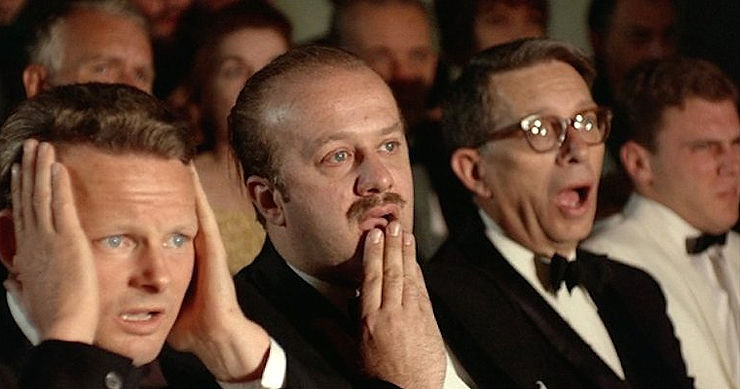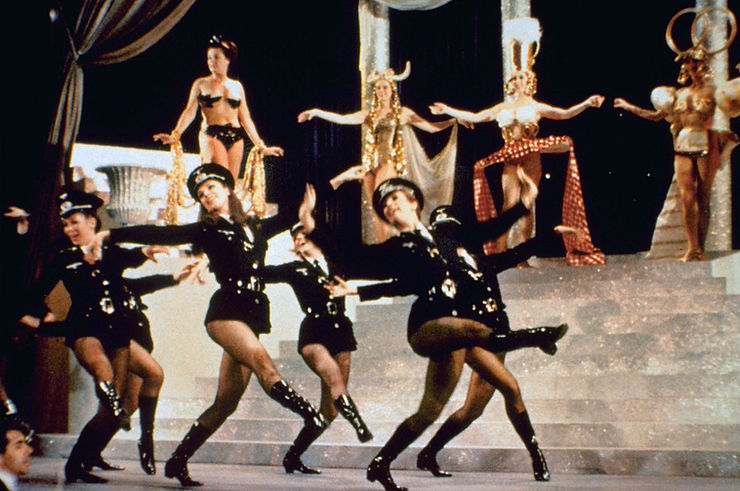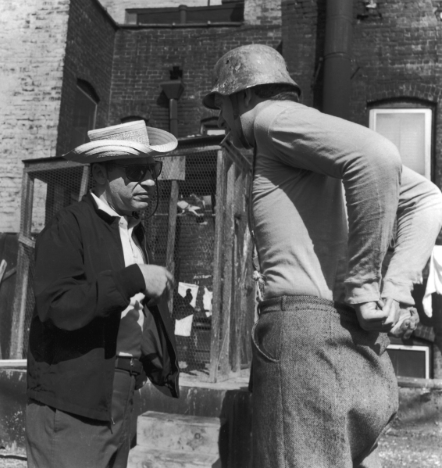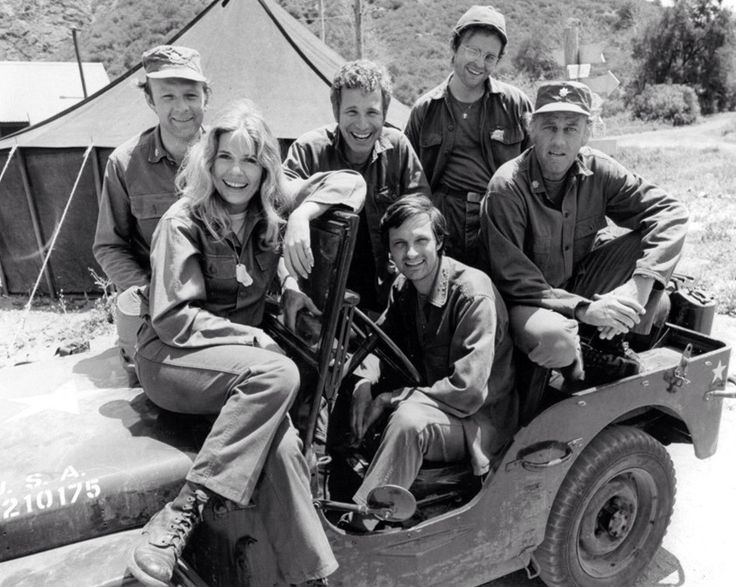Simply one of the funniest films ever made

Two Jews produce a Broadway musical about Adolf Hitler. Sounds like the beginning of a bad joke. But when it comes from the mind of comedic genius writer/director Mel Brooks, it becomes a premise for one of the boldest and funniest films ever made. A truly outrageous comedy, “The Producers” is so funny that even though I’ve seen it umpteen times, I needed a series of tissues to wipe away my tears of laughter while watching it yet again for this post. This cult film turned certified classic provides a joyous, one-of-a-kind laugh fest. It was nominated for two Academy Awards, winning one for its audacious script, and it often appears on greatest comedy film lists. The American Film Institute (AFI) ranked it as the 11th Funniest American Movie of All-Time. This film is laugh out loud funny!

Even the opening credits are laugh-tear inducing. The film opens on a closed door with the words “Max Bialystock, Theatrical Producer” written on frosted glass, behind which two silhouetted figures are playing kissy poo. Suddenly the door opens and out comes “Max Bialystock”, a disheveled fat man with a combover, looking to see if the coast is clear. A little old lady exits, they playfully say goodbye, and “Max” adds, “Don’t forget the checkie. Can’t produce plays without checkie”. With a smile she responds, “You can count on me, you dirty young man”. He pinches her butt, she laughs, and is off. He runs into his office, opens a cabinet filled with pictures of little old ladies and searches for one he calls “Hold Me Touch Me”. We see another little old lady knock at the door. “Max” opens it and says, “Darling!”. She responds emphatically, “Hold me, touch me”. He says “Not in the hallway”, and they enter his office. Their hilarious rendezvous is interspersed with the film’s opening credits.

We quickly learn that “Max” used to be King of Broadway but is now so unsuccessful he wears a cardboard belt and his only investors are what he calls little old ladies stopping off “to grab a last thrill on the way to the cemetery”. He and “Hold Me Touch Me” are interrupted by a nervous, neurotic accountant named “Leo Bloom”, sent to balance “Max’s” books. “Leo” quickly discovers that “Max” raised slightly more money than the cost of his last show, and when he asks about it, “Max” says “Who cares? The play was a flop”. “Max” gets “Leo” to alter his books, and “Leo” realizes a producer could make more money with a flop than with a hit. Through some finagling, “Max” gets “Leo” to join him in finding and producing the worst play ever written. The play they find is titled “Springtime for Hitler: A Gay Romp with Adolf and Eva at Berchtesgaden”, written by an unbalanced former Nazi named “Franz Liebkind”. As they proceed to produce the play, the most supremely wacky cast of characters to ever inhabit a film seem to come out of the woodwork.

Controversial in its day, “The Producers” is the crème de la crème of cinematic farce. Everyone is fair game in this throw-caution-to-the-wind comedy that still holds the power to induce chucklesome gasps. Never one to hold back (but never mean spirited), Brooks fearlessly presents his characters in all their zany, neurotic, gay, dumb blonde, or German craziness. He has often stated that one of his missions is to make people laugh at Hitler, and in this film he skillfully accomplishes that goal with scenes of auditioning Hitlers, and lines such as when “Franz” says, “Hitler. There was a painter. He could paint an entire apartment in one afternoon. Two coats!”. In the 2002 documentary, “The Making of the Producers”, Brooks explained, “The way to deal with despots like Hitler is not to get on a soapbox…with rhetoric, but to fight them with ridicule. To laugh at them. To laugh them into oblivion”.

After seeing the Broadway musical “Anything Goes” when he was nine, Brooklyn born Mel Brooks decided he was going to be in show business. By fourteen years old he was playing the drums, and at sixteen he began doing comedy. After serving in the US Army during WWII, he appeared as a musician, comedian, and even actor in various Borscht Belt resorts (a former Jewish vacation spot in the Catskill Mountains). Starting in 1949, he found work as a comedy writer for television, eventually writing for the groundbreaking variety, sketch comedy shows, “Your Show of Shows”, “Caesar’s Hour”, “The Dick Emery Show”, and many more (working with such writers as Carl Reiner and Neil Simon). He also created (and wrote several episodes for) the classic TV series “Get Smart”, which ran from 1965-1970.


In his teens Brooks worked for a theatrical producer who financed his plays by sleeping with women over the age of eighty in return for checks made out to his new play, which was always titled, “Cash”. Thinking this man would make an interesting character for a project, he began writing a book, which turned into a play, and finally into a film titled, “Springtime for Hitler”. Producer Sidney Glazier was immediately interested in producing the film. The script was not an easy sell as exhibitors were unwilling to put Hitler’s name on a marquee. Universal Studios showed interest, but only if the film was changed to “Springtime for Mussolini”. After close to a year, Embassy Pictures producer (and former film exhibitor) Joseph E. Levine got behind the film, convinced Brooks to change the name, and “The Producers” was made. After an unsuccessful, empty theater test screening, Embassy feared they had a failure and were going to shelve the film. Brooks thought his first film would be his last, but fate stepped in…

Actor Peter Sellers was in Los Angeles filming the Paul Mazursky film, “I Love You, Alice B. Toklas”. Bored, Sellers decided to create a weekly film night with some coworkers. One week Mazursky chose Federico Fellini’s “I Vitelloni”, but forgot to bring the film. Purely by coincidence, a copy of an unknown film by someone named Mel Brooks happened to be available, so they watched it instead. According to Mazursky, within the first five minutes they were all on the floor in hysterics and afterwards realized they had just seen a masterpiece. Sellers heard about the limited release of the film and immediately put an ad in two trade papers which read: “Last night I saw the ultimate film… ‘The Producers’, or as it was originally titled, ‘Springtime for Hitler’. Brilliantly written and directed by Mel Brooks, it is the essence of all great comedy combined in a single motion picture. Without any doubt, Mel Brooks displays true genius in weaving together tragedy-comedy, comedy-tragedy, pity, fear, hysteria, schizophrenia, inspired madness, and a largess of lunacy with shear magic. The casting was perfect. Those of us who have seen this film and understand it have experienced a phenomena which only occurs once in a life span”. As a result, the film became a hit New York City, where it ran for almost a year, slowly followed by other cities. In spite of mixed reviews, it was a hit. It became a cult film (eventually recognized as a classic), and Brooks won his only Oscar to date (Best Original Screenplay) for “The Producers”.

In addition to writing the screenplay, Brooks directed the film and wrote the songs, “Prisoner of Love”, and the show stoping“Springtime for Hitler”. Most people talk about Brooks’ comedy and not his directing style, but his spot-on direction superbly captures humor through camera angles, shots, and edits. Take for instance the moment when “Max” is dreaming of all the things he and “Leo” will do with all the money they’ll make. Brooks lingers on a shot of “Leo” with “Max” behind him leaning from left to right as he excitedly speaks. When “Max” almost orgasmically talks about going to Rio de Janeiro, Brooks cuts to a very tight close up of them cheek to cheek, with “Max” singing about Rio. The perfectly timed edit and close-up make the scene hilarious. In the 2002 documentary mentioned above, Brooks explains his talent: “The truth is I began my career as a drummer, so rhythm is critical to me. The rhythm of a scene, the rhythm of a singular performance, the rim shot of a joke. So as a drummer, I had a lot of unconscious and innate sense of what was rhythmically correct, and it has stood me in good stead all my life as a director”.

“The Producers” established Brooks as a top writer/director of comedies (particularly farce and parody), and to date he has written and directed eleven films – three of which AFI has ranked within the top 15 of The 100 Funniest American Movies Of All Time (”Blazing Saddles” is #6, ”The Producers” is #11, and ”Young Frankenstein” is #13). Some of his other films include “The Twelve Chairs”, “High Anxiety”, “Silent Movie”, “History of the World: Part 1”, and “Spaceballs”. He earned two additional Oscar nominations: Best Original Song for “Blazing Saddles”; and Best Adapted Screenplay (along with Gene Wilder) for “Young Frankenstein”. In 2001, he produced a Broadway musical version of “The Producers” which became a smash hit, earning twelve Tony Awards (three for Brooks) including Best Musical. To this day it holds the record as the Broadway show with the most Tony Awards for a single production. Brooks won four Emmy Awards for his television work (one for writing, and three as an actor for his recurring role on the TV sitcom “Mad About You”) out of thirteen nominations. He’s won three Grammy Awards (one for the Broadway soundtrack of “The Producers”, one for a music video for “The Producers”, and one for his comedy album, “The 2000 Year Old Man in the Year 2000”) out of ten nominations. In addition to being a rare EGOT (Emmy, Grammy, Oscar and Tony Award winner), he received a Kennedy Center Honor (2009), an AFI Life Achievement Award (2013), a British Film Institute Fellowship (2015), a BAFTA Fellowship (2017), and in 2016 was presented with the National Medal of Arts by President Barack Obama, among countless other awards. He was married once, to actress Anne Bancroft from 1964 until her death in 2005. No one makes me laugh as hard as Mel Brooks. As of this writing, this comedy legend is 95 years old, and just published his autobiography, “All About Me!: My Remarkable Life in Show Business”. Can’t wait to read it!





When he was eight years old, Wisconsin born Gene Wilder was told by a doctor to make his ill mother laugh, and so began his interest in acting. At thirteen he started studying acting, and was performing by age fifteen. He began studying with Lee Strasberg at the Actors Studio, and started to get off-Broadway work, leading to his Broadway debut in 1961 (a small part in “The Complaisant Lover”). Also in 1961 he began to appear on television, and landed his first film role in the 1967 classic “Bonnie and Clyde”. “The Producers” was his first major role, and he next starred in the 1970 comedy, “Start the Revolution Without Me”. In 1971 he starred as “Willy Wonka” in “Willy Wonka & the Chocolate Factory”, which like “The Producers”, has since become a classic. A year or so later, Wilder started writing a script called “Young Frankenstein”, and asked Brooks to work with him. Eventually Brooks co-wrote and directed it, but not before Wilder appeared in Brooks’ “Blazing Saddles“. Both “Blazing Saddles” and “Young Frankenstein” were big successes, the latter earning Wilder (and Brooks) a Best Adapted Screenplay Academy Award nomination (Wilder’s second and final Oscar nomination). Wilder began directing in 1975, and wrote and directed five films, including “The Adventure of Sherlock Holmes’ Smarter Brother” and “The World’s Greatest Lover”. He famously teamed opposite Richard Pryor in four films including “Silver Streak” and “Stir Crazy”, the latter of which was directed by Sidney Poitier. In 1982 Poitier directed Wilder again in “Hanky Panky”, this time opposite Gilda Radner. Wilder and Radner fell in love and married (until her early death), and appeared in three films together. Of his thirty seven film and TV credits, other notable films include “The Little Prince”, “The Frisco Kid”, and “The Woman in Red”. His final role was a recurring part on the TV sitcom “Will & Grace”, for which he won an Emmy Award (his only). He was married four times. Gene Wilder died in 2016 at the age of 83.



